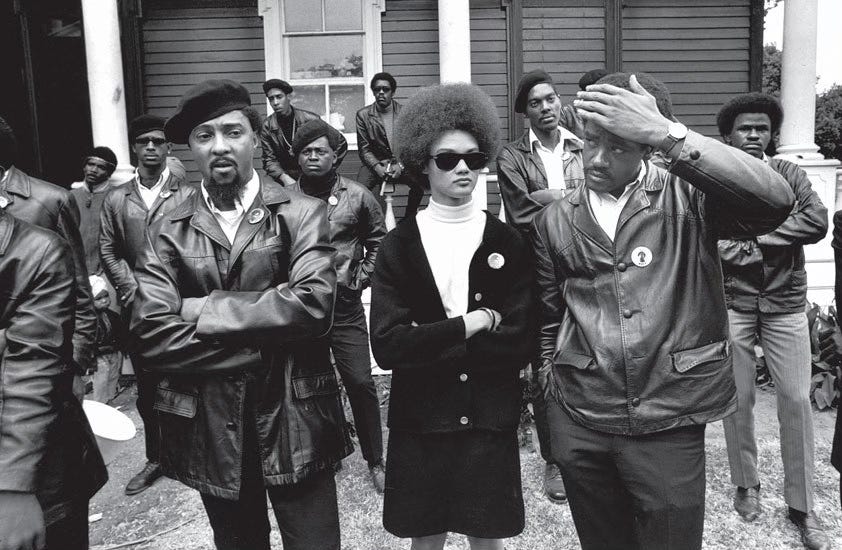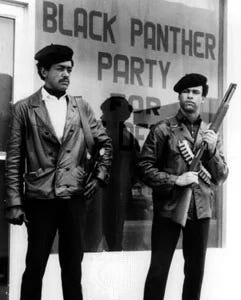On This Day: Fists Raised High
The Black Panther Party (BPP), was established on this day, October 15th, 1966, in Oakland California, by Huey P. Newton and Bobby Seale. It emerged as a revolutionary organization aimed initially at patrolling African American neighborhoods to shield residents from police brutality (originally the Black Panther Party for Self-Defense). Over time, it metamorphosed into a Marxist entity advocating for the arming of African Americans, the liberation of Black prisoners, and reparations for historical exploitation. The ideological foundation of the BPP was rooted in Black nationalism, socialism, and armed self-defense, particularly against police brutality.
The inception of the Black Panther Party was partly a response to systemic police brutality and racism. Noteworthy members of the party, besides the founders, included Eldridge Cleaver, Elaine Brown, Angela Davis, and Fred Hampton, who were pivotal in propelling the party's militant and revolutionary agenda. The party's agenda drew inspiration from notable Black nationalist figures like Malcolm X and Stokely Carmichael, embodying the slogan “Freedom by any means necessary” and the phrase “Black Power” which became the rallying cries for the movement.
One of the most impactful programs launched by the Black Panther Party was the Free Breakfast for Children Program, which not only addressed immediate hunger issues among disadvantaged children but also highlighted the systemic inequities in resource distribution. The success of this program was such that it laid the groundwork for the federal free breakfast programs we see today.
The Black Panther Party’s revolutionary stance didn't go unnoticed by the US government. The Federal Bureau of Investigation (FBI) deemed the BPP a threat. In 1969, J. Edgar Hoover, the Director of the Federal Bureau of Investigation (FBI), described the party as "the greatest threat to the internal security of the country.", launching a counterintelligence program (COINTELPRO) to dismantle it. The tactics employed were severe, encompassing misinformation, sabotage, and lethal force, resulting in several confrontations and fatalities, such as the death of Fred Hampton during a police raid.
Huey P. Newton, a seminal figure in the Black Panther Party, articulated a profound connection between the struggle for justice and the essence of the BPP. He noted, “The first lesson a revolutionary must learn is that he is a doomed man,” emphasizing the level of commitment and sacrifice inherent in the fight for social change. Newton's conviction about the role of law in society was clear when he stated, “Laws should be made to serve the people. People should not be made to serve the laws.” This belief underpinned the BPP's efforts to challenge and change the systemic inequities of the time. His stance on self-defense, a cornerstone of the BPP's ideology, was epitomized when he said, “Sometimes, if you want to get rid of the gun, you have to pick the gun up.” Newton also valued education and legal awareness as tools of empowerment, as reflected in his actions and words: “I always carried lawbooks in my car. Sometimes, when a policeman was harassing a citizen, I would stand off a little and read the relevant portions of the penal code in a loud voice to all within hearing distance...” Through these reflections, Newton encapsulates the essence of the Black Panther Party's mission: a blend of education, self-defense, and a relentless pursuit of justice, aimed at empowering the community against systemic oppression.

While the BPP had admirable goals, it also faced significant criticism due to several negative ramifications. Its militancy often led to violent confrontations with law enforcement, which, along with criminal activities by some members, severely tainted the party's image. Internal conflicts and ideological splits further destabilized the party, while the FBI's counteractions exacerbated these issues, leading to a decline in public support and a tarnished perception of Black activist movements. The legacy of radicalism left by the BPP, although inspiring to some, continues to be a point of contention, often overshadowing its positive contributions.
The legacy of the Black Panther Party transcends national boundaries. The party inspired activists worldwide, from the oppressed Dalits in India to the Vietnamese National Liberation Front, who called themselves Yellow Panthers. The BPP's influence was broad, resonating through its political philosophy, use of uniforms, and the Ten Point Program which found reflections in the activism of other global groups.
The ripple effects of the Black Panther Party’s activism continue to resonate in contemporary movements. Modern-day activists, particularly those affiliated with the Black Lives Matter movement, draw inspiration from the Black Panther Party's initiatives against systemic racism and police brutality. The BPP’s emphasis on community-based solutions, grassroots organizing, and systemic reform laid the groundwork for ongoing dialogues surrounding police reform, prison abolition, and racial equity.
The multi-faceted efforts of the Black Panther Party not only challenged the status quo but also catalyzed a broader dialogue on racial equity, leaving an indelible mark on the trajectory of social justice movements globally. Through a blend of direct action, community programs, and international solidarity, the Black Panther Party showcased the potency of organized resistance in confronting systemic oppression and fostering social change.




